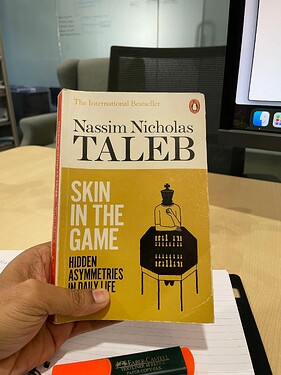Skin in the Game – N N Taleb
This is a thought-provoking book that explains the concept of skin in the game. He argues (and rightly so) that those who have a personal stake in the outcomes of their decisions, i.e. skin-in-the-game are more likely to act rationally, responsibly, and ethically.
Taleb masterfully connects the dots from disciplines such as economics, psychology, and history. Nevertheless, some analogies are difficult to comprehend. Certain sections explore religious contexts, which I would avoid as they are beyond my competence.
Talab’s original thinking is clear, as is his strong views and abrasive tone. He categorizes the majority of economists, policymakers, and behavioural psychologists as Intellectual Yet Idiots (IYI). A single chance to attack them has not been missed by him. IMO, he takes matters a bit too personally. Personal attacks on some authors such as Steven Pinker and Richard Thaler could have been avoided.
Highlighting some key ideas and lessons learned from the book.
Via Negativa
- We know what is wrong with more clarity than what is right.
- Knowledge grows by subtraction.
- Time removes the fragile and keeps the robust (Recommended read: What I learned about investing from Darwin by Pulak Prasad).
- Skin in the game makes boring things interesting, like an accountant reading notes to accounts and an air-hostess checking gates before taking off.
- Be wary of financial journalists and stock tippers. “Don’t tell me what you think, tell me what you have in your portfolio”. To further extend this notion: how much of your net worth is in the stock/business you’re advertising.
- Understanding behaviour of tribes/groups requires understanding of interactions between the tribe members. A group of 10 people won’t behave like a group of 5. Ant colony IS NOT the sum of individual ants. The market’s behaviour IS NOT average of behaviour of individuals.
- Stock Market is like a movie theater with a small exit door. A single stubborn seller can cause the market to decline disproportionately. E.g. Société Générale’s stubbornness led to 10% crash in 2009.
- The Hammurabi code is considered a true skin in the game. “If an architect builds a house and it collapses, the architect should be executed.”
Skin in the game
- Reading biographies of successful people written by journalists or content writers is a waste of time. Makes sense? If you want to learn about banking, who should you deeply read/listen to – Deepak Parekh / Uday Kotak or a talking head on CNBC who has owned 500 stocks in his 25 years of ILLUSTRATED career?
- A life coach can teach you to become a life coach. S/he can’t make you a lead a better life.
- Entrepreneurs (excluding hyper-funded), plumbers, blue collared workers, restaurant owners/workers add more value than IYI.
Intellectual yet idiot (IYI)
- Economists and bureaucrats, IYI don’t understand complex systems because interactions matter more than the nature of the individual units.
- Pretends to understand complex systems, but fails miserably (suggested read: Pretence of Knowledge by Hayek).
- Expects others to behave in a certain way without understanding that his understanding is flawed, not people’s behaviour.
On wealth / getting rich and success
- Bigger home ≠ happiness; Bigger home without folks = loneliness.
- Non-linearity of progress: Sophistication beyond a level causes degradation. More comfort for your kids will make them fragile and spoilt.
- Success ≠ Money earned without skin in the game.
- Success ≠ Money earned through passive investing, rent-seeking.
- Success ≠ Leading an honourable life.
Lindy effect + Via Negativa
- Fragile has asymmetric response to volatility. Fragile will experience more harm than good.
Investing maxims that I TRY TO follow and could relate from this book. Some of these are my strong and biased opinions and not to be construed as recommendations.
Via Negativa
- You don’t have to be smarter than others to get decent outcomes, being less stupid will do just fine.
- Don’t swing for the fences, especially when odds are not in favour.
- Don’t buy something that you don’t understand.
- Don’t buy fragile businesses.
- Don’t believe in everything you buy. Something will always go wrong. Max exposure to a single stock – 20%.
- Avoid tail risks.
- No to businesses that don’t pass forensic checks.
Knowledge grows by subtraction
- One doesn’t need too many ideas. As Munger said, “Take a simple idea and take it seriously”. Deep learning (reading, rereading the works of real experts with scars and skin-in-the-game) is far more impactful and valuable than shallow reading of 500 books.
- Beware of barbers who decide to perform brain surgery: shallow knowledge brokers, some economists with no skin-in-the-game, talking heads on Bloomberg/CNBC, sh!tfluencers etc.
| Subscribe To Our Free Newsletter |


